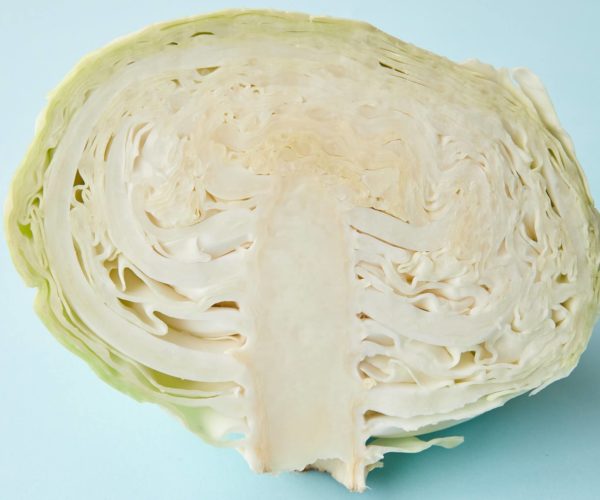7 Side Effects Of Eating Too Many Cabbages
Cabbage is a green leafy vegetable of the Brassicaceae or Cruciferae family and is closely related to other cole crops like cauliflower, broccoli, and Brussel sprouts, etc. They are available in many varieties such as red cabbage, purple cabbage, green cabbage, and white cabbage, etc, but, green cabbage is most popular and widely available. Cabbages are eaten both as vegetables and salad. They provide many health and beauty benefits as they have a rich nutritious profile loaded with essential nutrients like vitamins, minerals, antioxidants, and dietary fibers, etc. However, eating too many cabbages are bad, and should be avoided.
Side Effects of Eating Too Many Cabbages

Following are the major side effects of eating too many cabbages.
(1) May Cause Flatulence
Eat cabbages in moderation as otherwise, the indigestible sugar called “Raffinose” in them may cause flatulence, belching, abdominal discomfort, and bloating, etc.
(2) Increased Risk of Diarrhea
Cabbage contains insoluble fibers that improve bowel movement, relieve constipation, and other gastrointestinal problems like abdominal pain, gas, bloating, and flatulence, etc.
However, in excessive quantity, dietary fiber may cause diarrhea, poor absorption of nutrients, intestinal gas, intestinal blockage, etc.
Patients undergoing surgery are often advised to eliminate cabbage from their diet as it may worsen diarrhea often experienced during chemotherapy.
[irp]
(3) May React With The Anticoagulants
Cabbage is an excellent source of vitamin K, and both green cabbage and red cabbage respectively provide around 53 micrograms and 34 micrograms of vitamin K per cup.
Vitamin K is an essential nutrient that helps with blood clotting, and other functions such as regulating calcium levels, maintaining cardiovascular health, and maintaining cognitive health, deficient, etc.
However, vitamin K may interfere with the anticoagulants and reduce their effectiveness.
If you take anticoagulant medications, consult your doctor before adding cabbage to your diet.
(4) May Trigger Hypothyroidism
As per Linus Pauling Institute, overeating cruciferous vegetables such as cabbage while being iron deficient may increase the risk of hyperthyroidism. This is because the glucosinolates in the cabbage interfere with the production of thyroid hormone, and iron deficiency worsens the situation giving rise to hyperthyroidism.
[irp]
(5) Usage of Cabbage During Pregnancy & Breastfeeding
Cabbage helps in maintaining healthy pregnancy as it is loaded with essential nutrients like vitamins, minerals, antioxidants, flavonoids, and dietary fibers, etc.
Antioxidants like vitamin C protects the fetus from free radical damage, and folic acid helps with the brain development of the fetus. Folic acid also reduces the risk of neural tube defects like Spina bifida.
As cabbage reduces blood sugar levels, it helps in managing gestational diabetes.
However, dietary fibers in cabbage may overstimulate the bowel movement and lead to diarrhea and other digestive problems like abdominal pain, bloating, flatulence, etc.
On excessive intake, glucosinolates in the cabbage may cause bloating and sharp pain in the stomach.
To ensure safety, consult with your doctor before adding cabbages to your diet.
(6) Eating Cabbage And Regulating Blood Sugar
Cabbage has a low glycemic index of 10 and slowly releases sugar into the bloodstream. This prevents a sudden rise in the blood sugar level and helps in managing diabetes.
Dietary fibers also help in regulating blood sugar levels, as they slow down the absorption of sugar by the bloodstream.
However, it is better to eat cabbages in moderation as otherwise, they may drop blood sugar below the normal level and give rise to shakiness, dizziness, excessive sweating, excessive hunger, fast heartbeat, confusion, and irritability, or moodiness.
If you take diabetic medication, consult your doctor before adding cabbages to your diet as they may interfere with the diabetic medication.
Because of cabbage’s ability to interfere with blood sugar levels, people who have scheduled surgery are often advised to stop eating cabbages two weeks before surgery and post-surgery.
[irp]
(7) Cabbage And Regulating High Blood Pressure
A single cup of shredded cabbage provides around 119 mg of potassium.
Potassium is a vital mineral that relaxes our blood vessels, improves blood circulation, and provides provide relief from hypertension or high blood pressure.
Hypertension is a silent killer that causes several cardiovascular and other health problems and affects surgery before the world.
However, avoid eating too many cabbages as the high potassium level may drop blood pressure below the healthy levels and cause dizziness, fainting, nausea, dehydration, lack of concentration, blurred vision, and pale skin, etc.
If you take blood pressure medication, eat cabbages only after consulting with your doctor to ensure there is no food-drug intolerance.
Disclaimer
The information contained in the post is for general purpose only and shouldn’t be considered as medical advice or as an alternative to medical advice. Although I’ve tried my best to keep the information contained in this post as accurate and updated as possible, I make no guarantee of the accurateness of the same.
P.S- Consider sharing this post, if you find it useful and/or interesting.
